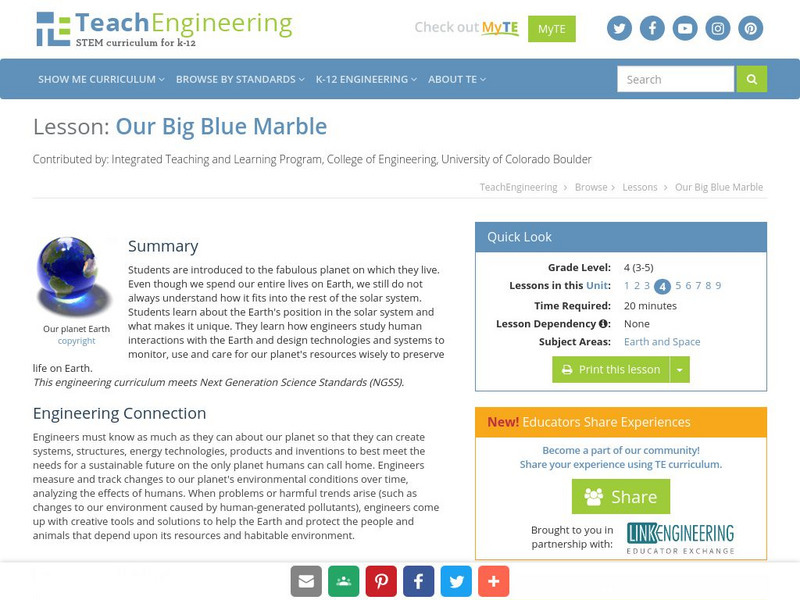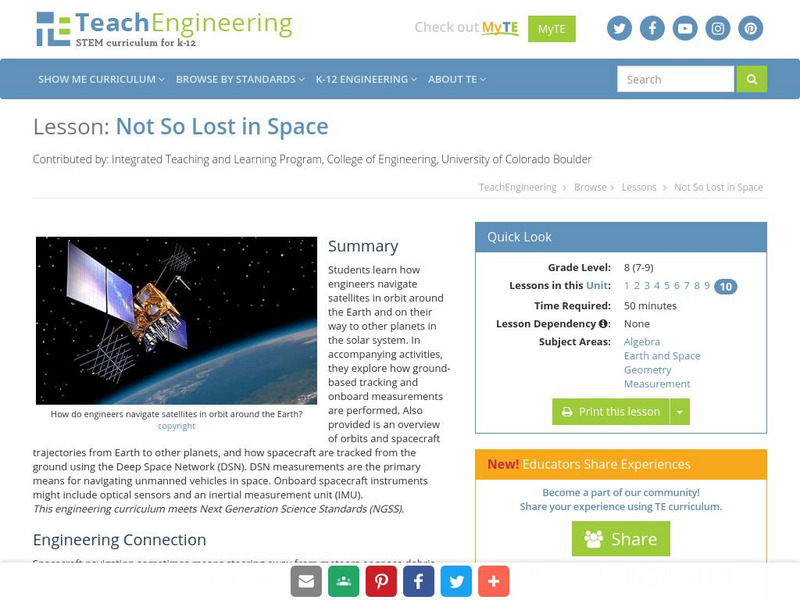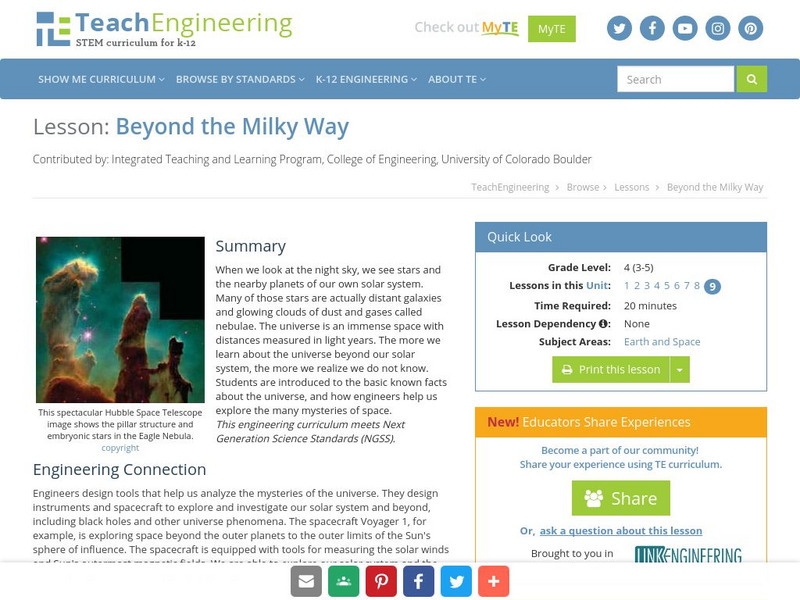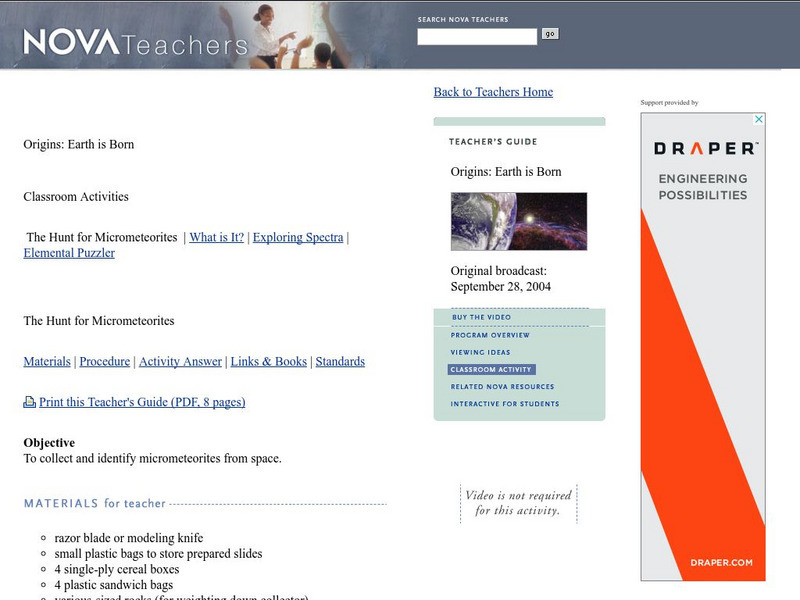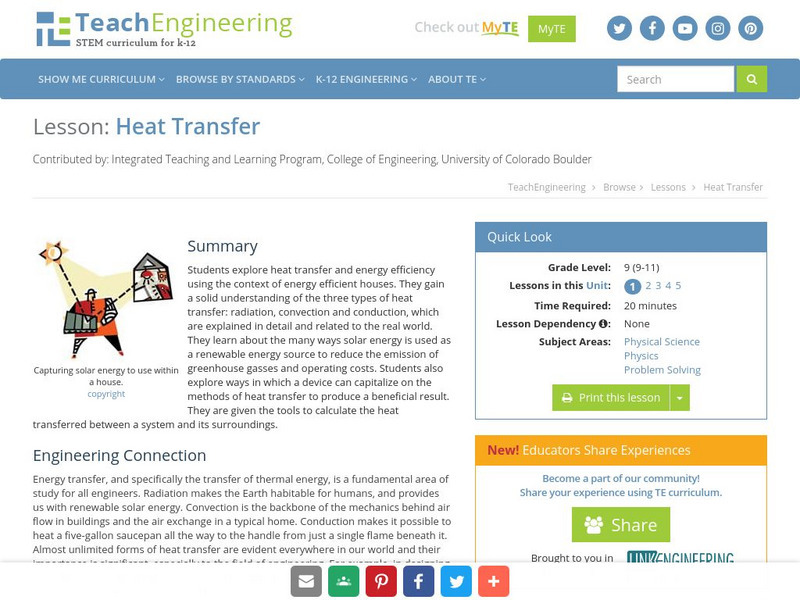PBS
Pbs Learning Media: Solar System Scale Model
Teach the concept of scale models and the size of the solar system through this extensive lesson plan. Students will learn about scale models, estimate which objects to use to create a scale model of Earth and Sun, and figure out how far...
Alabama Learning Exchange
Alex: Lost in Space a Solar System Study
During this technology based lesson plan, learners navigate the Internet to learn interesting information about the solar system. They use the information to complete a worksheet and to create a puzzle or challenge for their classmates.
Alabama Learning Exchange
Alex: Inner and Outer Planets of the Solar System
In this science lesson students will work collaboratively to learn and introduce the eight planets, sizes, characteristics, and their order. They will use size comparisons, research a planet, design a poster and create a PowerPoint...
TeachEngineering
Teach Engineering: Our Big Blue Marble
Students are introduced to the fabulous planet on which they live. Even though we spend our entire lives on Earth, we still do not always understand how it fits into the rest of the solar system. Students learn about the Earth's position...
Alabama Learning Exchange
Alex: Beyond the Earth Part Ii
A continuation of Beyond the Earth Part I. As part of a unit on the solar system, students will choose a component of the solar system to research. Students may use a variety of resources such as the Internet, books, and reference...
TeachEngineering
Teach Engineering: Not So Lost in Space
Students learn how engineers navigate satellites in orbit around the Earth and on their way to other planets in the solar system. In accompanying activities, they explore how ground-based tracking and onboard measurements are performed....
Alabama Learning Exchange
Alex: Phases of the Moon
This lesson plan will familiarize learners with the phases of the moon. It can be taught in a unit dealing with the solar system. It involves all learning types-kinesthetic, auditory, tactile, and visual.
Other
Boston Children's Museum: Moon Leap
Discover why the effects of gravity are different in different parts of our solar system.
University of Texas at Austin
The University of Texas Mc Donald Observatory: Rock Cycle
This activity combines the concept of Earth's rock cycle with the characteristics of other planets in the solar system.
Other
Lunar and Planetary Institute: Explore! Jupiter's Family Secrets
A variety of hands-on activities, investigations, and explorations designed to engage learners in discovering planet Jupiter.
TeachEngineering
Teach Engineering: Beyond the Milky Way
When we look at the night sky, we see stars and the nearby planets of our own solar system. Many of those stars are actually distant galaxies and glowing clouds of dust and gases called nebulae. The universe is an immense space with...
TeachEngineering
Teach Engineering: The Outer Planets
Students explore the outermost planets of our solar system: Saturn, Uranus and Neptune. They also learn about characteristics of Pluto and its interactions with Neptune. Students learn a little about the history of space travel as well...
PBS
Pbs Teachers: Origins: Earth Is Born
Collect micrometeorites from space -- remnants of the time when the solar system formed about 4.6 billion years ago. Create a sky dust collector, sort particularate matter according to attributes and identify micrometeorites by their...
TeachEngineering
Teach Engineering: Heat Transfer
Students explore heat transfer and energy efficiency using the context of energy efficient houses. They gain a solid understanding of the three types of heat transfer: radiation, convection and conduction, which are explained in detail...
TeachEngineering
Teach Engineering: Destination Outer Space
Students acquire a basic understanding of the science and engineering of space travel as well as a brief history of space exploration. They learn about the scientists and engineers who made space travel possible and briefly examine some...
Discovery Education
Discovery Education: Path to Mars
Learners use websites and other resource materials to compare and contrast features of Mars and Earth.
Science Buddies
Science Buddies: Kinesthetic Astronomy: Earth's Rotation
This kinesthetic activity will demonstrate concepts like rotation and orbit, clarify movement and direction, and help learners understand why earthlings see different things in the sky.
University of Texas at Austin
The University of Texas Mc Donald Observatory: Sunspots
Experiment involves identifying sunspots, temporary phenomena on the Sun's photosphere that appear as spots darker than the surrounding areas.
Other popular searches
- Solar System Crossword
- Solar System Worksheets
- Solar System Word Search
- Solar System Art
- The Solar System
- Solar System Lesson Plans
- Solar System Math
- School Projects Solar System
- Components of the Solar System
- Solar System Model
- Earth Movement Solar System
- Solar System Constellations



